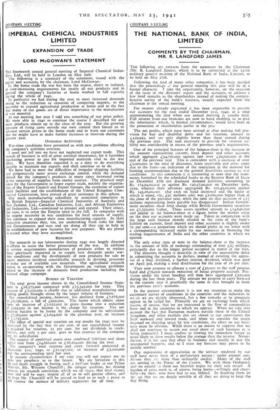COMPANY WEETaNG
THE NATIONAL BANK OF INDIA, LIMITED
COMMENTS BY THE CHAIRMAN, MR. R. LANGFORD JAMES
TriE following are extracts from the statement by the Chairman (Mr. R. Langford James), which is to be submitted at the 127th ordinary general meeting of the National Bank of India, Limited, to be held on May 27th.
Following the lead of many other companies it has been decided
that the proceedings our general meeting this year will be of a formal character I take the opportunity, however, on the occasion of the issue of the directors' report and the accounts, to address a few brief remarks to the shareholders instead of making the compre- hensive survey of the bank's business, usually expected from the chairman at the annual meeting.
For reasons already explained it has been impossible to present our accounts for the year ended December 3Ist, 1940, at a time approximating the date when our annual meeting is usually held. Full returns from our branches are now to hand enabling us to give the informatior which, in normal circumstances, would have been in the possession of shareholders earlier in the year The net profits, which have been arrived at after making full pro- vision for bad and doubtful debts and for taxation, amount to £439,943, and are only slightly lower than those earned during the previous year. The sum necessary to provide for taxation lia- bility was considerably in excess of the previous year's requirements.
One of the principal features of the balance-sheet is the increase in the amount representing current, fixed deposit and other accounts which aggregate £34,750,000 against just over £29,000,000 at the end of the previous year This is coincident with a decrease of over £2,000,000 in the total of discounts, loans receivable and other sums due to the bank—an indication of the restriction in the demand for banking accommodation due to the general disabilities created oy war conditions. In this connexion it is interesting to note that the state- ments furnished by the scheduled banks to the Reserve Bank of Intim on December 27th last disclosed demand liabilities amounting to Rs. 174,94,00,ou0 as against Rs. 146,57,00,000 on December 29th, 1939, whereas their advances aggregated Rs. ior,45,00,000 against Rs. 143,16,00,kxao. Our cash on hand increased and the figure at which it stood, viz., £91 millions odd, was £2,66o,00o higher than at the close of the previous year, while the item on that occasion of £11 millions representing loans payable has disappeared Indian Govern- ment securities show little change while British Government securities are £1,335,000 higher. These assets together amount to £14,646,000 and appear in .he balance-sheet at a figure below the market value on the date our accounts were made up. Taken in conjunction with the large cash balance already alluded to the ratio of the bank's liability on current, fixed deposit and other accounts is slightly under 70 per cent.—a proportion which we should prefer to see lower with a corresponding increased outlet for our resources in financing the trading requirements of India and the other countries in which we operate.
The only other item of note in the balance-sheet is the increase in the amount of bills of exchange outstanding of over ,C,21 millions, principally due to the longer period occupied in transit of the bills.
The directors thought it desirable in view of the unavoidable delay in submitting the accounts to declare, instead of awaiting the appro- val of a final dividend, a further interim dividend, which was paid on April 3rd, making a total distribution for the year of 16 per cent.
They now propose to allocate a sum of £50,000 to the staff pension fund and £70,000 towards reduction of house property account. Pro- vision under the latter heading will then have aggregated £22o,000 during the last three years. .The amount we propose to carry forward to the current year is practically the same as that brought in from the previous year's accounts.
In the present circumstances it is not my intention to make the customary survey of conditions in the countries and the industries in whIch we are mainly interested, but a few remarks as to prospects appear to be called for. Primarily we are an exchange bank which means, of course, that we are interested in the flow of commodities from and to the countries in which we operate When we take into account the fact. that European markets outside those of the United Kingdom, and other markets also are dosed to our constituents for both outward and inward trade, and when we consider the strain imposed on shipping space by war conditions, the effect on our busi- ness must be obvious. While there is no reason to suppose that we shall not continue to secure our usual share of such business as is being transacted, I must confess to viewing the immediate future as more likely to show results below the average than the reverse. Never- theless, it is the case that often in business and usually in war the unexpected happens, and so I trust my forecast may prove to be unduly sombre.
Our expressions af appreciation ox the service rendered by our staff have never been of a perfunctory nature ; under present con- ditions they are more than ordinarily cordial. Many of the staff are serving, in the Forces of the Clown. We wish them Godspeed, and we extend on them our heartfelt hopes for their safe return. A burden of extra work is, of course, being borne—willingly and cheer- fully—by thost who have had to stay behind. In thanking them let nr: say that we are deeply sensible of all they are doing to keep the flag flying.






























 Previous page
Previous page